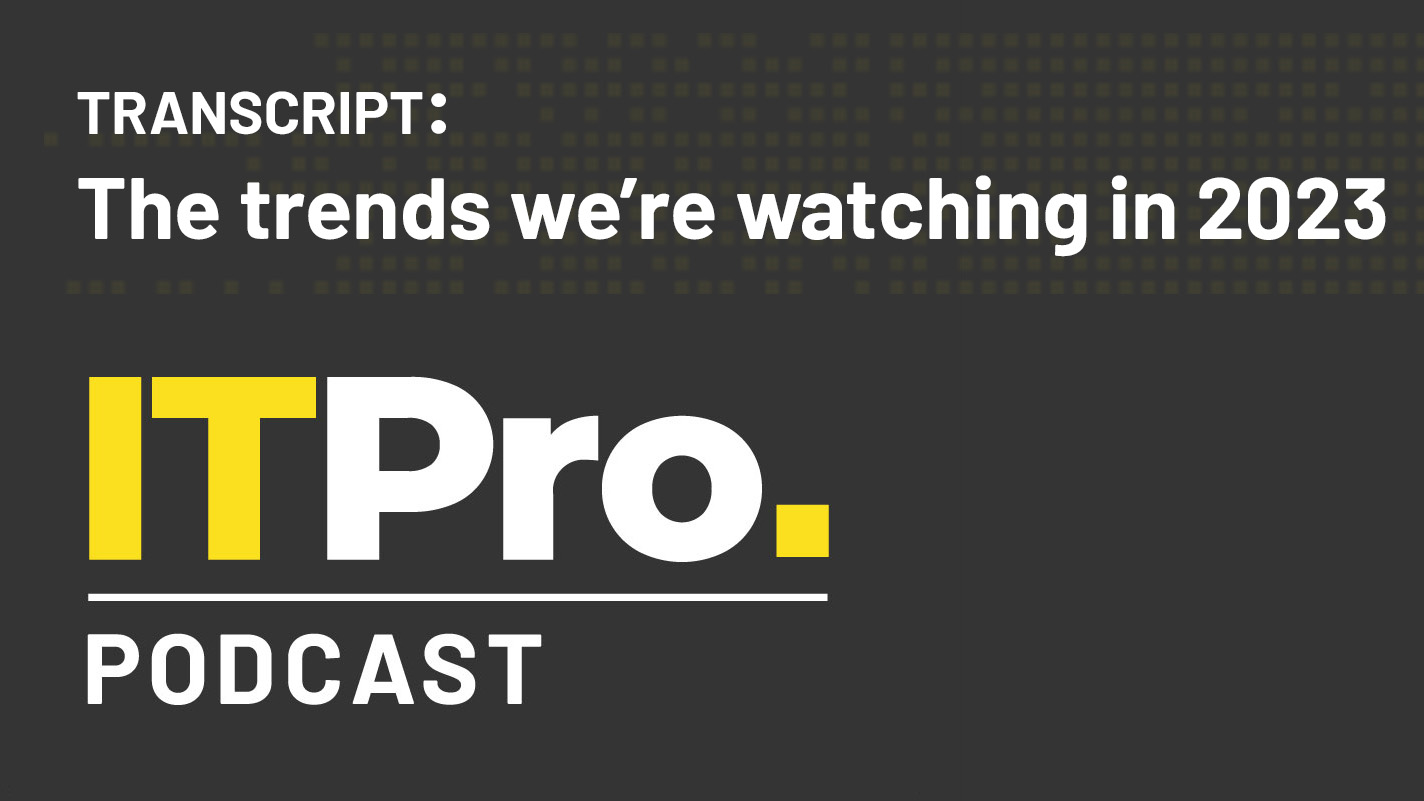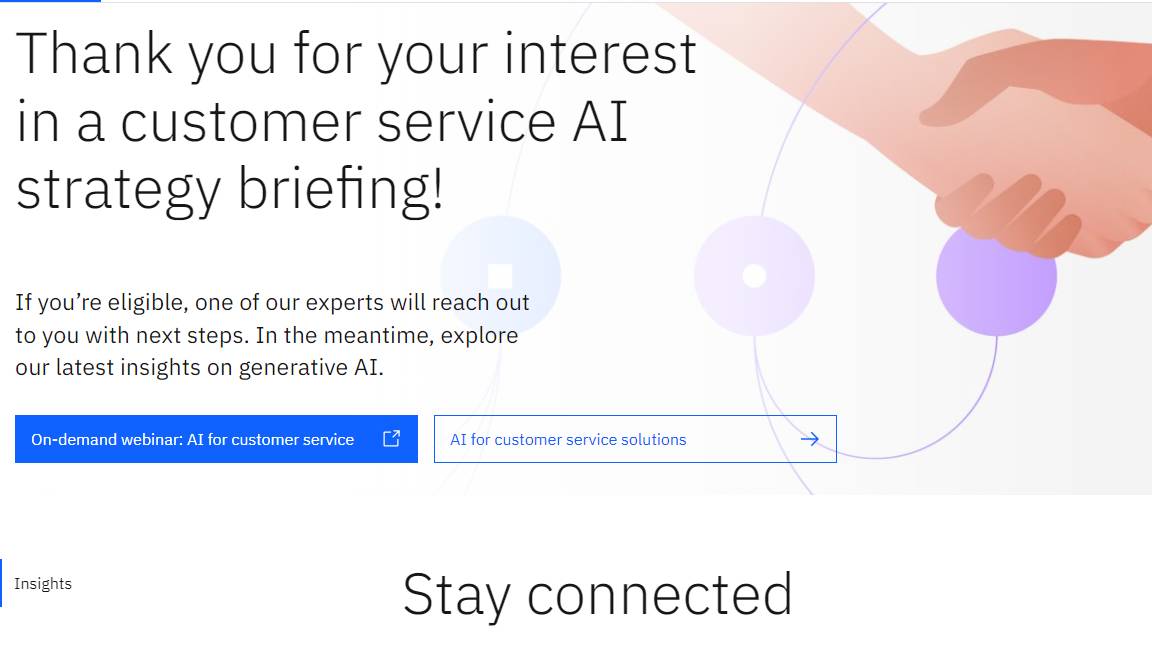Podcast transcript: The trends we’re watching in 2023
Read the full transcript for this episode of the IT Pro Podcast

This automatically-generated transcript is taken from the IT Pro Podcast episode ‘The trends we’re watching in 2023'. We apologise for any errors.
Jane McCallion
Hi, I'm Jane McCallion.
Rory Bathgate
And I'm Rory Bathgate.
Jane
And you are listening to another festive edition of the IT Pro Podcast.
Rory
It's the time of year where people like to make predictions, experts in the tech sector will be pointing to the top trends for 2023, as well as the technologies that they think could take root or really take off in the new year.
Jane
Sign up today and you will receive a free copy of our Future Focus 2025 report - the leading guidance on AI, cybersecurity and other IT challenges as per 700+ senior executives
And indeed, in the past, this is something that we have done on the IT Pro Podcast and on the website. But this year, we're taking a slightly different tack. Rather than making predictions and perhaps looking back on ourselves a little bit foolish in a couple of months time, such as me in 2020 predicting that COVID was going to be nothing, we've decided to take a look at the continuing trends that are happening now that we feel will influence the coming year.
Rory
Absolutely. And to start off with we're looking at a story that hasn't dominated headlines for the whole year. But throughout November and December has dominated headlines. That is the situation at Twitter, and what this means for the balance of social media.
Jane
Yes, so this is one that rumbled from about May onwards, when Tesla CEO and SpaceX CEO Elon Musk was forced, frankly, to buy Twitter after some shenanigans earlier on in the year. On again, off again on again off again. Finally, he has and he is — I was gonna say reshaping it in his own image but he's, he's reshaping it in the shape of something, something.
Rory
A crater. A crater in the ground. Yes I think if you've been regularly listening to the podcast, for the last couple of episodes, it has come up briefly. We discussed the problem with verification, in our episode on identity. And I think this is the initial crux of the issue was Musk coming in on a mantra of free speech, free speech absolutism. And the verification system such as it was at time of acquisition was was really in his sights.
Jane
It's probably worth talking about what the verification system was doing at the time. So it's something that Twitter has had a problem with, it's been a bit up and down for a while. Now, I personally am a 'blue tick' at a point where you could basically just submit a form saying I'm a worthy person. Yeah, I'm, I'm journalist with a well known B2B technology publication. IT Pro in case that wasn't clear, and I was able to get verification like that. Prior to that it seemed to be, more or less, a bit random. And then they put the verification, or at least verification requests, on hold for a bit. Now Musk took a bit of a different tack to how this verification system should work, and a very libertarian tack.
Rory
Absolutely. After weeks of rumours surrounding a paid verification tier, and a very public spat with Stephen King, in which he appeared to be haggling the price down they eventually unveiled the $8 Twitter Blue verification system. Which would let anyone who was willing to pay $8 a month be verified on Twitter. Now, it's worth noting that all of these changes in the initial weeks following the acquisition were happening against a backdrop of a very, very public redundancies of Twitter employees. Within a few days of taking control of the company, Musk fired the entire executive board, and shortly afterwards 50% of Twitter's entire workforce were fired overnight. Some of them found out by losing control of their Slack. Others had their laptops remotely wiped, or lost control of their or lost access to their company Gmail accounts. It was a very widely reported upending of the workforce. A lot of employees ironically took to Twitter to register their grievance at having been fired, and it also heralded a massive change in the internal company strategy. In the same time period. Musk demanded that employees should subscribe to 'hard core' is how he described it, hard core work ethic. There was an email that was circulated to employees that gave them a deadline by which they had to agree to the new working conditions, or accept severance pay and leave their roles which led to another wave of resignations and redundancies of people who hadn't exactly quit but weren't agreeing to the new terms, leaving the Twitter workforce really a shadow of its former self by the end of November.
Jane
So there are lots of things packaged up in this. One of them that struck me, actually, is this email about the hardcore workers, you know, "you've got to work 80 hours a day", and all that kind of stuff. The manner of doing it, I think, is possibly against a lot of EU and definitely British working regulations. Now, this may not sound like a particularly techy topic. But it's something that American companies and often American sort of social media companies, tech companies, startup companies rub up against; they don't have the same protections as we do over here. You can't just say to somebody, "agree to these unreasonable conditions, or you're out". That's, that's not a way to, it's not a way to run anything. And it's not a legal way to run anything over here. So I do wonder how much of the workforce affected was over here, versus how many were in the US. That said it's by the by because the big fallout of this was, like you said, it an identity issue.
Rory
Exactly. We've got some very interesting legal comment in our coverage of these original changes in the workforce, which will be in the show notes. But the flaws in the changes to the verification system became very quickly apparent. One of the most notable examples in the immediate aftermath of the change was with the company Eli Lilly, which is a pharmaceutical giant in America, and also Lockheed Martin, which is an aerospace and weapons manufacturer. Both had their official accounts impersonated by a random user who who paid $8.
Jane
Somebody with a spare $8, yeah.
Rory
Exactly. In the case of Eli Lilly, I'm paraphrasing here, but the tweet was along the lines of "insulin is now free". And a similarly damaging tweet for Lockheed Martin was put out to change the company brand image. And in both cases, both companies had billions knocked off their share value, which is a kind of a...
Jane
It's a big deal.
Rory
Yeah, a very vivid illustration of the kind of problems that these these changes can cause. There's a lot of concern registered by advertisers. A bunch of notable household names, at the time of the change, had put their Twitter advertising budgets on pause, were holding off on advertising on Twitter until the situation could be stabilised or remedied. And indeed, there was a kind of a screeching U turn within a week or two of the change coming into effect in which they stepped back.
Jane
So I think it's worth kind of actually looking at the history of this a little bit. This isn't the first time it's happened. I'm not one of those people who is to throw myself in front of valid criticism of Elon Musk. But those of us who are old enough to remember the Leveson inquiry into phone hacking, may remember that a certain Wendi Deng who was at the time the wife of Rupert Murdoch suddenly had a verified Twitter account. And it wasn't it wasn't her, it was quite manifestly not her. But that was at the time when Twitter was just like, "yeah sure, seems legit, blue tick". So while this particular instance of sort of raking in $8, from people who actually care to be verified leading to chaos, it's not the first time that Twitter has had a verification issue at all, at all.
Rory
Exactly. It follows a long history of changes at the platform, but it does illustrate, at least for me, how unstable the platform is. Because it's become such a noteworthy social media platform, a channel for official communication, government communication, and a real key channel for advertising for companies. You kind of come to think of Twitter as a kind of immutable entity that that can't be brought down by a couple of simple changes to its moderation, or to its verification policies. But of course, that's what we've seen happen.
Jane
I would challenge you. We haven't seen Twitter disappear.
Rory
No.
Jane
Oh, no, it's gone now. Rory, no Rory's living in the future and 2023 we're predicting the downfall of Twitter.
Rory
So it's interesting. I think what I mean is that the image of Twitter, as with some other social media platforms it’s okay, there's an outage now and again, but the platform is more or less unkillable. I think that's been shaken up in a lot of people's minds. I think it's reminded people that these platforms do rely on a workforce. Again, it'll be in the show notes but we put out a story on one of the systems engineers who is behind Twitter's automation system, and the systems that keep the platform at its most basic levels running. He's behind most of those, he put up a blog post to explain why it's more or less good no matter how many people they fire up within that department to keep going barring natural disaster that takes out the data centre or something along those lines. But in other departments like, for example, the comms department, I know that a lot of journalists were shocked to discover in the immediate weeks following the acquisition, that they couldn't get comments from Twitter, because, as the Verge put it, "there is no longer a communications department at Twitter". Now at time of recording, I'm not sure if people have been hired again in that in those roles. But it does upend your image of this kind of monolithic social media entity and force you to take a step back and remember that, you know, if it was continued to be managed in the way that it was, in the first few weeks, Twitter very well might have lost a good chunk of its advertisers. And while it might not have gone up in flames, for a minute there it was really suffering in terms of ad revenue. And, you know, it's course corrected a bit now. But I think it's been potentially quite damaging for the company image.
Jane
Yeah. And there were a lot of users who to say that they jumped ship isn't right, because a lot of them are still there. But they have also joined alternative services, such as notably Mastodon.
Rory
Exactly. So the reason we bring all this up is because it's this upending of the social media ecosystem, and forcing people to consider alternatives, we think is likely to continue on in 2023. And Mastodon is really chief among these alternatives. Although it functions a bit differently to Twitter, it runs using servers, which are a bit more siloed than the kind of homogenous experience you'd expect from from a lot of modern social media. And as a result has been compared to more of a forum experience by some users, Mastodon has seen massive interest and massive growth in user base in the last two months. Its traffic has risen from 1.4 to 9.5 million in the past month.
Jane
I wonder how sticky and sustainable that is?
Rory
Yeah, I think something that Mastodon has immediately run into is the problem with onboarding that many people. I know that when the Twitter changes first came into effect, Mastodon didn't exactly present itself as a as an alternative, people found it and said, "this is good enough" and moved there. And I think the system admins were struggling to keep up with the server load for a sec. But also, there are questions that remain around the viability of the platform. Now, it completely depends on on your, what you want out of your social media. I think people who already have quite an established following, and maybe they communicate with their following in a way akin to say a blog. So I've seen a few legal commentators on Twitter have really taken to Mastodon, like a duck to water. That's beneficial for them. If you're trying to grow a following on Mastodon, it is harder. As I've said before, the kind of siloed nature prevents people from maybe accidentally stumbling across your across your account in the same way that you can on Twitter. And I know that some people, alternatively, who have spent years growing a following on Twitter are quite reluctant to kind of up and move to another platform, especially people who who feel they've really just made it. They can't now afford to say, "everyone who follows me on here, you know, you should all enrol in this site as well". And there's a whole there's a whole extended process involved in that which logistically can be quite difficult. And I think companies also, a big thing about Mastodon is it has no verification process in the same way that Twitter does.
Jane
We're back to Wendi Deng and all that from the beginning again.
Rory
Exactly. We've seen the problems that that can cause so I think advertisers, companies might be reluctant.
Jane
I mean I think, when it comes to Twitter, we're not gonna see it topple over in my opinion. I appreciate that I'm making a prediction here. But I think what we are going to see is just basically a continuation, for now, for the next couple of months, which I think is as far into the future that we can really predict, continued sort of like fumbling, you know, a few users getting freaked out again. But actually, in the end, it just kind of fumbles along. Maybe sort of Musk takes a step back, but I really think it's hard to predict what any individual is going to do. But yeah, definitely for the first say quarter of 2023 Twitter is gonna, it's still gonna be there as a service. It will still face the same problems as it ever has, which is monetization and verification. You know, depending on how things go, it looks like yeah, they're really pushing Twitter Blue. That's certainly something that I'm seeing on the sidebar of my account right now. But, yeah, I think the stories of its demise have been greatly exaggerated.
Rory
And of course, as we mentioned, last episode Meta faces financial difficulties going into 2023. They've already locked in a lot of Metaverse tech R&D, which is going to be difficult to get out of which exacerbates an existing issue they're having which is that it's not making a lot of money right now. And there's not a lot of investor confidence in it. Other trends in 2023, that I have already been signalled are the UK Government, as has been for the last few years, is opposed to end to end encryption without a backdoor for government services, which puts them on a crash course with WhatsApp —
Jane
With reality. With reality, is what it puts it on a crash course with. "Oh yeah a backdoor, but only for the government. Uh huh, that's not how technology works".
Rory
Exactly. So that's gonna that's likely a fight that will continue to play itself out throughout 2023 and probably 2024. And then in the US, there is a bill that has been proposed in Congress to limit or ban Tiktok in the country. Now, TikTok has already faced criticism by US officials. Earlier this year, TikTok made moves to divest operations in America. Oracle now handles all of the US users information —
Jane
Why do they care? Can you just update us on why Congress cares about what, as far as I can tell, is an app where people post dances, yoga and then being the main characters. Why do they care?
Rory
So Tik Tok has repeatedly been called a national security concern. TikTok obviously denies this. And there's a lot of talk and back and forth around the potential for information to be shared, harvested, and because of ByteDance's links to the to the Chinese government, there's always been a back and forth between America and indeed other nation states, such as India, which put a TikTok ban in place in 2020. But this is similar to the end to end encryption fight. This is unlikely to resolve itself in 2023.
Jane
I mean, I'll be honest with you, if Congress people would stop using TikTok to film themselves twerking, then it wouldn't be it wouldn't be a national security issue, you wouldn't have to worry about the government getting access to your highly encrypted and secure Wi-Fi. This is the solution.
Rory
Well, we'll see how that relates to 2023.
Jane
Okay.
Moving on, from dancing everybody, onto something else that's also a big trend for kind of silly. People cannot stop talking about AI, generative AI. Can you quickly explain for us what generative AI is?
Rory
Absolutely. So generative AI has been in the works for quite a few years. There's a couple of different companies doing it. OpenAI is the one that's really been dominating conversation on Twitter in the past few weeks. So OpenAI's, natural language processing model, and generative model GPT is now in its fourth iteration. And this is essentially an AI model where you can input a prompt and it will spit out either an image or a text output. We've seen this throughout the year with with DALL·E and DALL·E Mini. People are having a lot of fun typing in any prompt, and a kind of illustrated image comes out as a result. And there are a bunch of different companies doing this as well, different models in the market for this, like Stable Diffusion, and Craiyon, which is a free version.
Jane
You of course, have some experience with DALL·E and ChatGPT that our listeners can have a look at as part of our recent content.
Rory
Absolutely. So I was set the enviable task of creating some Christmas cards from IT Pro, using Chat GPT, and DALL·E. And I have to say that the outputs were, almost without exception, pretty much nonsense. I think generative AI is is doubtlessly becoming more powerful by the month. These are models that are trained by their user base, and are now operating with hundreds of millions of images worth of training. That having been said, there is a knack to getting it to output something that is usable in any in any real world setting. You can see in the show notes, the article on Christmas cards. And I mean, see for yourself, how many of these you'd be willing to give to a co-worker?
Jane
Depends how much your co-worker really.
Rory
True. I think we were discussing this just before we started recording the podcast. But I think the problem with a lot of AI images. One of the problems right now is that because they work on something called a diffusion model, which is essentially generating images that start out as just noise, random pixels, and then changed pixel by pixel, based on a statistical model to resemble the prompts that you've given it, they almost always just look very wobbly and strange when you when you look at them in any kind of fine detail. If you squint, and you stand back, first glance, they look alright.
Jane
Yes, and this is you're almost in an uncanny valley situation. So this is something that we've seen with the Christmas cards that you've very kindly created for us. But also, some of the other things that I've seen people playing around with. There was somebody who put in that they wanted the machine to generate some text from Shakespeare. And it's interesting to look at, like, at first glance, it's like, "oh, yeah this is, wow, that's really good". And then you're like, actually it's not, because it's kind of, it's not about anything. It's all just like, "but forsooth, sir. I dost see that thou art the most powerful king in the land. Yes, you are correct". This is not Shakespeare. But it's written in the style of Shakespeare. But, you know, like I say, it's that kind of first glance that surface level thing that it really looks like it could be right. Apart from some of them, especially DALL·E. But yeah, that first glimpse, you're like, Oh, yeah. And they're like well, "happy storage".
Rory
Yeah. What I've discovered also tinkering for the Christmas cards, is that it doesn't currently have any real understanding of form, or of metre. I tried to get it to generate some haikus. It cannot do haikus, it cannot do poetry. I asked for a haiku that had the word 'Kubernetes' in it. And the first line of the haiku was 'Kubernetes'. Which is a great start.
Jane
Now that we've got that out of the way...
Rory
Let's, let's give you something that still isn't a haiku. So there's a long way to go in terms of the text generation. Because a lot of these tools are free to use, they run often on a credit system where you get, you know, X number of goes a month or something and you can pay for more. These are just at the moment, they seem quite a fun toy, people are going to continue to talk about them because they're very easy to use. They're very easy to access. And for that they're quite powerful. So it's very easy to see that, you know, these are going to continue to dominate conversation in 2023.
Jane
Recently, though, there have been some problems that are perhaps slightly less entertaining than chortling at Christmas cards. The notable one would be Stack Overflow. They are a knowledge repository for technologists. So if you're listening to this, you probably know that, and they've banned, temporarily so they say, Chat GPT from the platform because very much like we were just saying it's coming up with things that superficially look like answers to the questions that people are asking. But they're not like, the form is kind of right, but the actual answers are not helpful or are nonsense. And it's overwhelming the mod team there. So this is a kind of now that people are starting to use it a bit more seriously, I guess, it's starting to throw up real world problems. And these have just started, so are very likely to continue into the new year. This is one of these continuing trends.
Rory
Absolutely. You know, something that comes to mind is a few years ago, this is terrible that I can't remember the exact example. But quite a well known website was down. And there was a Twitter thread by a programmer who said, I know, I know what exact error has caused this website to go down. And I know why. And it's because a few years ago, I gave this code as an answer on Stack Overflow. And I was wrong, there's a logic error in it. But unfortunately, because I was up-voted, or however voting works in StackOverflow, because so many people said "this is it, this is the correct answer". And because there's only a very specific circumstance in which it would cause the code to crash, people still think it's the correct answer. And there's nothing I can do to, you know, un-post that, it's now been shared so many times as as the correct solution. And I think this is something that the moderators have expressed concern over currently with with Stack Overflow is Chat GPT, like we're saying, is very good at giving answers that at first glance appear perfectly right. But in some cases, moderators have had to go over, and bearing in mind they're experts in programming, have had to go over an answer several times before they figured out exactly what error the AI has introduced into the code. And therefore lock the post, remove it as an answer. So the problem is, this isn't obviously isolated to just one account, anyone can go to Chat GPT, to Open AI, and ask for these answers. And then post them as if this is something they've written. And because it's written with the correct authorial voice as well, it can come across as as if it's been written by an expert programmer, when in fact, it could have quite damaging errors and in the code.
Jane
I do want to kind of, you know, what is, what is the motivation behind this? If you're not an expert, you're not even confidently incorrect. You know, this isn't your own thoughts. Are you hoping that Chat GPT, misunderstanding what it is, hoping that it's going to come out with the right answer, because it's AI and you don't really know that? Are you doing it for fake internet points? Are you just doing it to to mess with people? I really struggle to see what the motivation is there, and whatever that motivation is is going to continue to be a problem in the situation and others as well, that we probably haven't come across yet.
Rory
Yeah, absolutely. I think it's a mix. It's a mix of all of the above. I mean, I've never been one to really understand that the desire to accrue made up internet points, but it's certainly a big driving factor for people. And I think there's also unfortunately, you know, a sizable user base who were just trying to share what they think is a good answer. I think, Twitter, a lot of Twitter posts were made in the weeks following this model becoming publicly available, where people were really proposing it as an alternative to Google to find answers saying "oh, it's so much more detailed in the answers that it gives".
Jane
You're consulting the oracle at this point, honestly, or throwing down some some bones and some chicken entrails and hoping to get divine an answer. This is God forgive, I can feel my blood pressure rising. Listeners, I'm sure you've missed me being extremely angry about this technology in general. But it is like the modern day equivalent of yeah, consulting the oracle, consulting the spirits, and you've seen this over and over again in tech that people just take it to be some kind of new all powerful all knowing being, whereas actually, it's got the reasoning of a six month old.
Rory
Yeah, it's very capable of sounding like an expert. It's not an expert, and it's not peer reviewed. And it's not — Or maybe peer reviewed isn't the right term. Because obviously there are there's a lot of research that goes into generating the model. But once the model is out there, there's no real oversight of each individual response that it's going to give.
Jane
They are the self-published novels of answers to technical questions.
Rory
Exactly. And I mean, I had a muck around with the the text model in generating some simple Python code. And I, you know, I have a basic understanding of Python and the code it gave me was sound, it would work. But the point is, I didn't have to consult anyone, no one saw the code that it gave me apart from me. So if I copied and pasted this into something more critical... alarm bells maybe are are ringing at that point for systems administrators. And I think with Stack Overflow as well, because it's become such a trusted resource, it makes sense that they would want to put the brakes on this one until we can actually figure out maybe a better moderation or oversight process.
Jane
Yeah or indeed, if you let it back on the platform at all. Maybe the answer is to make this ban permanent.
Rory
Yeah. Yeah, it very well could be. I'd be remiss, while we're talking about the AI models, not to mention something that's already very, very dominant in conversation around them. And that is copyright and artistic licence.
Jane
Oh, yeah.
Rory
This is I mean, this could this could be a whole podcast in and of itself. And I'm certainly I'm not a copyright legal expert. But I know that a lot of artists are, shall we say, very displeased already, at the way that the models are trained, which is essentially scraping images off the internet. There has been a growing trend recently, where you'll see someone posts, if you follow artists on Twitter, or Instagram or anywhere, really. There's been a growing trend, where in the comments, if you look out for them, you'll see people saying, "what kind of art style would you describe your art as?" And it looks like you know, it's an innocent enough question. But very quickly artists have figured out that actually, what these people mean is "what prompt can I can I put into something like DALL·E to reproduce art that looks like yours?" Or indeed, reproduce art that has been trained on your art to produce something, something for myself? This is I mean, we're not making predictions, but this is already kind of causing a lot of headaches. Doubtless, legal experts are gearing up for several protracted battles over this. Again, I'm not under a legal expert. I'm not this doesn't apply to any specific company or any company's model currently. But it's definitely an ethical and legal discussion that's gonna continue to grow in momentum throughout 2023. And I imagine for as long as AI models are trained on publicly available art, including text.
Jane
Yeah, yeah. And something else that, you know, I've seen come up within this is these artists, if you like, who have used some kind of generative AI to create whatever it is they're coming up with. Somebody then uses that as a prompt to create their own stuff, and then they start getting upset. So yeah, I think there's a lot of plagiarism. Am I being a little bit slanderous myself? But yeah, to be honest with you, plagiarism and then plagiarism of plagiarism going on. It's a tricky one.
Rory
Yeah, it's kind of an ethical minefield right now. And it's the difference between a fun tool that you can use and, as you pointed out, when you start to infringe on other people's work. And I wouldn't be surprised if companies are also looking at this. I think any company that has very, very visually distinct IP right now is likely having these conversations internally. And you know, as models are trained, this doesn't just apply to visual imagery either. That same goes for things like source code, as you as you said, you can you can generate code quite easily using it. And I think, if it has access to public repositories, that's a whole separate minefield, that maybe could rear its head or continue to in 2023.
Jane
So the final topic that we're going to touch on, it's a classic, it's come back, we are dipping into recession again. This is not a prediction, once again it is happening right now. And economists believe that it's going to last until 2024. The words are being used is "long but shallow", which I'm not, I'm not sure whether I prefer long, shallow recessions to short, sharp recessions. Or if I indeed have a favourite, but this is going to affect everything, and everyone it always does. The tech industry quite often proves to be fairly resilient to this or tech positions. But it's very hard to say whether or not that is going to be the case again this time.
Rory
Yeah, so we've heard the phrase "economic headwinds" passed around a lot. In the last year, as we came out of government spending on the pandemic, and also around the invasion of Ukraine. There's a lot to costs and a lot to inflation. Obviously, your mileage may vary by country, individual government decisions have impacted this in different regions as well.
Jane
We also had in this country, the mini budget, and Liz Truss' brief but impactful premiership that other countries have not had to deal with. So, you know, even if this is a global recession, we are perhaps on the backfoot a little bit. There's also another thing to take into consideration, which was not the case during the previous most recent recession, which is which I think was 2012. It's been many in my lifetime. And we are now far more in a sort of hybrid working, remote working world, which may or may not have some impact as well.
Rory
Yeah, absolutely. I think this is something a lot of companies are now contending with this is kind of happening as a double whammy alongside the energy crisis. There's a lot of calculations going on about whether it's better to have your workforce at home or have them in a kind of a centralised office —
Jane
Where they can huddle together for warmth —
Rory
Exactly. And also, frankly, a lot of cuts, a lot of cost-saving measures already being implemented. We saw Meta following, their recent financials to bring that back up again, fired 11,000 people, and they were quite frank in saying "we just made the wrong predictions with our investments, they didn't they play out as we were expecting". And that's kind of on them. But it's emblematic of wider measures that are being made in the tech sector. Microsoft has similarly made moves to slow hiring. I mean, we've seen Google earlier in the year allegedly cut an entire Pixelbook range. Smaller, and larger decisions like this are all adding up to a kind of an overall picture of — spending is being reduced in the tech sector.
Jane
And within IT departments as well, this is going to have a knock on effect. Even if hopefully, you don't have to make many or any redundancies, the problem is going to be if there's no money to go around it's an awful lot harder to make your case for investment in IT. Whether that is anything from upgrading your users laptops, to a new server for your data centre, or even you know a new cloud contract. In general, procurement is going to be a big issue for the next year or two. And we actually have plenty of written content coming up on the website about that kind of thing. So do keep an eye out for all that.
Rory
There's just going to be a lot more of this coming out. This isn't again, this is not so much a prediction. It's just the reality of the situation. We're already seeing companies, I mean halfway through the year, we were seeing companies starting to make these decisions. It was quite clear that the direction that the wind shifted in, to extend that headwind metaphor, and it's just understandably going to be something that continues to kind of dominate strategy going forward in 2023 and 2024.
Jane
And on that, particularly cheerful note, I think that it is time for the two of us to say goodbye.
Rory
Absolutely. As always, everything we've discussed in this episode will be in the show notes, and you can find even more on our website at itpro.co.uk.
Jane
If you're enjoying the show, don't forget to subscribe to the IT Pro Podcast and if you can leave us a rating and review.
Rory
We'll be back in the new year next week with more from the world of IT but until then, goodbye.
Jane
Goodbye
ITPro is a global business technology website providing the latest news, analysis, and business insight for IT decision-makers. Whether it's cyber security, cloud computing, IT infrastructure, or business strategy, we aim to equip leaders with the data they need to make informed IT investments.
For regular updates delivered to your inbox and social feeds, be sure to sign up to our daily newsletter and follow on us LinkedIn and Twitter.
-
 TPUs: Google's home advantage
TPUs: Google's home advantageITPro Podcast How does TPU v7 stack up against Nvidia's latest chips – and can Google scale AI using only its own supply?
-
 Microsoft Excel is still alive and kicking at 40
Microsoft Excel is still alive and kicking at 40News A recent survey found Gen Z and Millennial finance professionals have a strong “emotional attachment” to Microsoft Excel
-
 Future focus 2025: Technologies, trends, and transformation
Future focus 2025: Technologies, trends, and transformationWhitepaper Actionable insight for IT decision-makers to drive business success today and tomorrow
-
 Choosing the Best RMM Solution for Your MSP Business
Choosing the Best RMM Solution for Your MSP BusinessWhitepaper Discover a powerful technology platform that empowers Managed Services Providers (MSPs)
-
 Datto SIRIS business continuity and disaster recovery
Datto SIRIS business continuity and disaster recoveryWhitepaper Save time without cutting corners
-
 IBM watsonx code assistant for Z brings generative AI to mainframe application modernization
IBM watsonx code assistant for Z brings generative AI to mainframe application modernizationwhitepaper Modernize mainframe applications and adopt a hybrid cloud strategy
-
 The revolutionary content supply chain
The revolutionary content supply chainwhitepaper How generative AI supercharges creativity and productivity
-
 HR champions generative AI
HR champions generative AIwhitepaper Embrace experimentation, empower people
-
 Consulting client briefing
Consulting client briefingwhitepaper Jump ahead of your competitors with generative AI
-
 CEOs guide to generative AI-finance
CEOs guide to generative AI-financewhitepaper Adopt a new approach to financial management that leverages the power of generative AI

